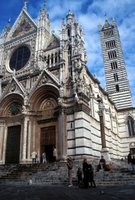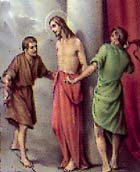 "Christology" is how a person or group views Jesus in relation
"Christology" is how a person or group views Jesus in relation ship to the Divine and in relationship to the Human. "High Christology" emphasizes the Divinity of Jesus, with a greater and greater removal from the human aspect. It is evidenced in art and architecture and theology.
ship to the Divine and in relationship to the Human. "High Christology" emphasizes the Divinity of Jesus, with a greater and greater removal from the human aspect. It is evidenced in art and architecture and theology.High Christology venerates the sacred texts and the holiness of God so much so that the altar in High Christology cathedrals is removed farther and farther from the people. The structure tends to be linear, with the populace kept back by series of barriers or rails beyond which only special holy servants may go. Teaching happens from a lofty pulpit. Only the holy servants, almost always historically exclusively male, are allowed access t
 o the sacred texts, which they then interpret and feed to the populace. Even holy communion was removed from the people in stages. From drinking for themselves from the cup, the people then had to have it held for them. Finally, when the thought of a peasant possibly spilling the "sacred blood" was so dreadful (and required a ritual cleansing or even removal
o the sacred texts, which they then interpret and feed to the populace. Even holy communion was removed from the people in stages. From drinking for themselves from the cup, the people then had to have it held for them. Finally, when the thought of a peasant possibly spilling the "sacred blood" was so dreadful (and required a ritual cleansing or even removal  and ritual burning of the flooring material affected), they no longer wanted to risk this possibility and took the wine out of the ritual altogether.
and ritual burning of the flooring material affected), they no longer wanted to risk this possibility and took the wine out of the ritual altogether.Contact of the sacred and the "secular" was so abhorrent, they built in layer after layer of removal, as if the "special" humans had the need to or even the ability to "protect" the holy things of the Word and of God from mere peasant-human contamination.
High Christology produces shame and fear in relation to God, and makes God so powerful and removed and essentially Judgmental and unloving, that we turn our faces away out of fear of destruction because of our own unworthiness.

High Christology doesn't like a
 nything from mere humanity to touch or taint God's holiness. Jesus is pictured as always serene. While being flogged, he looks a little sad or somewhat bored. While in Gethsemane or on the cross, he looks slightly sad, with every hair in place and his garments artfully arranged. The famous movie, "Jesus of Nazareth" shows Him as virtually without emotion, no joy, no laughter, virtually no humanity, always apart and separate. Different. Disconnected from real human experience or emotion or process. He never looks messy or dirty.
nything from mere humanity to touch or taint God's holiness. Jesus is pictured as always serene. While being flogged, he looks a little sad or somewhat bored. While in Gethsemane or on the cross, he looks slightly sad, with every hair in place and his garments artfully arranged. The famous movie, "Jesus of Nazareth" shows Him as virtually without emotion, no joy, no laughter, virtually no humanity, always apart and separate. Different. Disconnected from real human experience or emotion or process. He never looks messy or dirty.There is a place for reverence, but as soon as we are making the "real" God inhuman, pushing God as far away as possible from humanity, we are completely missing the point of His incarnation.
When we make God so Divine and pure and unable to accept our humanity that we hide our faces out of fear and shame, something has gone terribly wrong. It is WE that cannot accept our imperfections, not God.
There is a place for reverence for the holy texts, but any human or group of humans that sees itself as especially appointed to interpret God's Word for others and tries to cut off the people from direct access to the Word is presuming that God cannot handle his creation nor take care of His own Word. It is a case of mistaken self-importance and actually shows disrespect for God by trying to handle things on His behalf, as if he can't manage---all in the name of His holiness.
Clergy are consultants and wise advisors. They should never presume to know better than the one they are supporting. They are teachers and empower-ers (is there such a word?) not parents, not police, not dictators.
God's two great commandments?
LOVE the Lord and Love the neighbour.
Not "fear the Lord and judge the neighbour."
Not "presume that you are closer to the Lord than the neighbour and therefore must control the neighbour for their own good."
The Lord is pressing to be received at every second, not recoiling in horror from His children and needing the nanny to wash us and bathe us and dress us up and feed us before He deigns to let us cower at His footstool.
Fear is the opposite of love. Fear, when not understood or addressed or handed over to God, almost always ends up as controlling behaviours and justification of controlling behaviour.
Just some thoughts.
Hi Alison,
ReplyDeleteGod's two great commandments?
LOVE the Lord and Love the neighbour.
Not "fear the Lord and judge the neighbour."
Not "presume that you are closer to the Lord than the neighbour and therefore must control the neighbour for their own good."
You rebel. But that's a tried and true philosophy- it's just that people need to do it harder or more, to make it work...